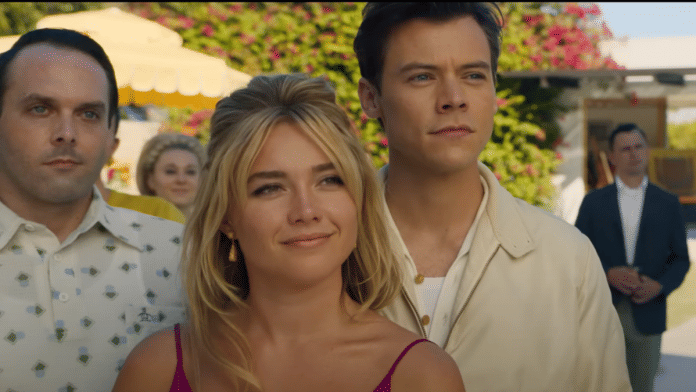If there is one silver lining to the entire media ‘slapfight’ surrounding Olivia Wilde’s new film Don’t Worry Darling, it’s that the drama may get this bland, uninspired and derivative film way more box office heft than it ever deserves.
Wilde had turned heads three years ago with the release of her directorial debut Booksmart (2019), which rivalled prior coming-of-age comedies like Superbad (2007) and Dazed and Confused (1993) by wearing its influences on its sleeve while still breaking new ground.
Don’t Worry Darling only borrows liberally from sci-fi works like Inception (2010), The Stepford Wives (2004), The Master (2012) and The Truman Show (1998) without generating any interesting material on its own.
Despite having a well-intentioned message that deserved to be hard-hitting and harrowing, Wilde’s film is fundamentally broken throughout, primarily due to the hacky script penned by her frequent collaborator Katie Silberman.
Silberman introduces some cool ideas and themes at first, starting with the apparent 1950s period piece setting in a company town in the middle of the desert that is owned by the nebulous Victory Project.
In doing so, Silberman appears to juxtapose references to the Church of Scientology’s rural headquarters and Mormons’ love of Utah with parallels to the Nevada-based nuclear weapons testing and the subsequent Eddie Bravo-esque conspiracy theories.
The concept that something is wrong with this Victory world as experienced by the protagonist Alice Warren Chambers — played by Florence Pugh — is also introduced in a suspenseful way, involving tremors, eggs and ominous looks from a troubled neighbour, played by KiKi Layne.
The film is at its strongest from this point on, with the continuing buildup of psychological thriller and horror elements, and a bit of sci-fi slipped in. Pugh and most of her cast members, especially Chris Pine who plays Victory Project chief Frank, look the part and deliver near-perfectly here.
Pugh sells you on her mental anguish, Layne shines early on providing the early signs of danger while Pine and fellow residents played by Nick Kroll, Gemma Chan, Asif Ali, Kate Berlant and Wilde herself are convincing in their gaslighting.
However, not only do the dialogues range from overly simple to awfully empty, the biggest mistake, aside from the script, rests on the decision to cast Harry Styles as Shia LeBoeuf’s replacement.
It is a net positive to see alleged domestic abuser LeBouef off our screens for a little while longer, but the new hire needed to be his equal, if not more, in ability. Unfortunately, for Styles and his legion of rabid fans, he is amateurish in his best moments and completely wooden in his worst, a massive step down from his supporting role in Dunkirk (2017).
For all of Pugh’s best efforts, she gets little in return to the appropriate standard from Styles, whose accent world tour feels reminiscent of Pooja Mishra from Bigg Boss Season 5, rather than whatever transatlantic 1950s drawl he seemed to be going for. No wonder Chris Pine was rolling his eyes so much whenever Styles opened his mouth at the Venice Film Festival.
As a result, the far more capable supporting cast is relegated to thinly written roles, be it the aforementioned neighbour residents, or the fabulously creepy Dr Collins, portrayed by Timothy Simons of Veep fame.
These faults come to a head in a poorly conceived climax, featuring a telegraphed car chase and even more predictable bouts of violence that is completely tension-free — a fatal mistake for a purported psychological sci-fi thriller.






